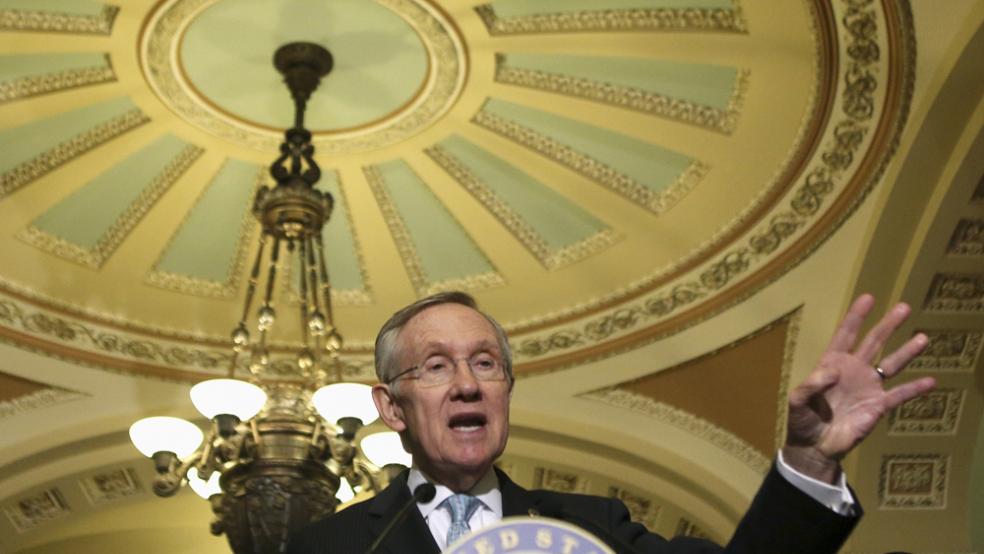Democrats in Washington seized on the gloomy jobs report released Friday to increase pressure on Republicans as the two sides fight over renewing an extension of federal unemployment insurance.
The jobs data was surprisingly weak. The economy produced an anemic 74,000 net jobs last month, far below the 197,000 expected by economists, and the percentage of unemployed workers who have been looking for work for 27 weeks or more jumped to 37.7, according to data released by the Bureau of Labor Statistics this morning.
“Today's report shows why Republicans must join with Democrats to immediately extend emergency unemployment insurance,” Senate Majority Leader Harry Reid said on Twitter not long after the report was issued.
Related: GOP Sees Plenty of Options On Unemployment Insurance ‘Pay-Fors’
In a blog post on the White House website, Council of Economic Advisers Chairman Jason Furman wrote, “Congress allowed extended unemployment insurance to lapse at the end of 2013, cutting off a critical lifeline to those who lost a job through no fault of their own and are still searching for work…today’s jobs numbers show that while we are making progress, extended unemployment insurance benefits remain necessary and should be the first order of business in 2014.”
However, in a statement provided to reporters, Republican House Speaker John Boehner made only a veiled reference to the debate over extending unemployment benefits.
“There are more families living in poverty today than there were before the president took office, and instead of making it easier to find a good-paying job, Washington has been more focused on making it less difficult to live without one,” Boehner said.
Related: Millennials’ Joblessness Costs the Government $8.9 Billion a Year
Boehner and other Republicans have indicated they are willing to consider an extension of benefits, but only if offsetting spending cuts are also made, a condition that has not, historically, been required in eras of persistently high unemployment.
On Thursday, before the BLS numbers were released, a statement from the office of House Ways and Means Committee Chairman Dave Camp (R-MI), echoed a sentiment repeated by a number of prominent Republicans: Unemployment insurance hurts workers.
“Despite a dozen extensions, academic research suggests the program has actually hurt, rather than helped, the job creation that the unemployed need most,” the statement read. “It is time to focus on policies that will actually lead to real economic opportunities for families who are trying to get back on their feet and back into the workplace.”
The 74,000 figure reported by BLS was less than half of the consensus forecast, and far short of the monthly average of 183,000 jobs the economy produced during all of 2013. The BLS report also showed the unemployment rate ticking down to 6.7 percent from 7.0 percent, but the change was actually the product of bad news.
“About two-thirds of the decline is because people withdrew from the labor force,” said Gary Burtless, a senior fellow in economic studies at the Brookings Institution. “If they keep banging their heads against the wall month after month and not finding a job, after a while it feels better to stop”
Related: Unemployment Insurance – 6 Need-to-Know Insights
The problem is not that the unemployed are unwilling to work, Burtless said, but that there are literally no jobs for them to take. “Long-term unemployment remains at historically very high levels compared with anything we saw before 2009,” he said. “We have almost three self reported job seekers for every job that employers have on offer.”
In this climate, the extension of federal unemployment benefits should be a no-brainer, said economist Jared Bernstein, a senior fellow with the Center on Budget and Policy Priorities.
Even before today’s report, “there was already a case to be made based on the share of long-term unemployed in the labor force,” Bernstein said. “Even if this number is revised up it stands as a reminder that the job market is just not welcoming enough to the long-term unemployed to end the extension of benefits.”
There is no historical precedent for allowing jobless benefit extensions to expire under such poor economic conditions, Bernstein said. “Right now, 2.5 percent of the labor force is long-term unemployed. Historically, Congress has only allowed extended benefits to expire when the number has been half that.”
Follow Rob Garver on Twitter: @rrgarver
Top Reads from The Fiscal Times:
- New Record High for Independents Slams Both Parties
- Congress Likely to Pass $1 Trillion Spending Bill Without Reading It
- The New Majority Party in Congress: Millionaires




